

Scot Osterweil. Home - Zoombinis. Hard Fun. By Seymour Papert I have had a lot of flack from people who read this column (and other things I have written) as advocating taking the hard work and discipline out of learning.
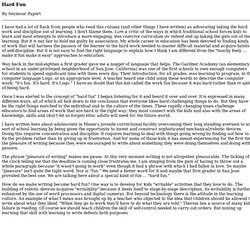
I don't blame them. I am a critic of the ways in which traditional school forces kids to learn and most attempts to introduce a more engaging, less coercive curriculum do indeed end up taking the guts out of the learning. But it is not fair to hold me guilty by association. My whole career in education has been devoted to finding kinds of work that will harness the passion of the learner to the hard work needed to master difficult material and acquire habits of self-discipline. Way back in the mid-eighties a first grader gave me a nugget of language that helps.
Once I was alerted to the concept of "hard fun" I began listening for it and heard it over and over. The phrase "pleasure of writing" makes me pause. Does Teaching Kids To Get 'Gritty' Help Them Get Ahead? : NPR Ed. Hide captionAt the Lenox Academy in Brooklyn, N.Y., educators try to teach kids to see struggle as a normal part of learning.
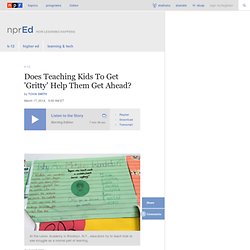
Tovia Smith/NPR At the Lenox Academy in Brooklyn, N.Y., educators try to teach kids to see struggle as a normal part of learning. Tovia Smith reported this audio story in two parts on Morning Edition and All Things Considered. To hear Part One, click 'Listen To The Story' above. For Part Two, 'Lessons In Grit,' click the link below. It's become the new buzz phrase in education: "Got grit? " Around the nation, schools are beginning to see grit as key to students' success — and just as important to teach as reading and math. Experts define grit as persistence, determination and resilience; it's that je ne sais quoi that drives one kid to practice trumpet or study Spanish for hours — or years — on end, while another quits after the first setback.
"It's a very, I think, American idea in some ways — really pursuing something against all odds," she says. What is Mindset. Every so often a truly groundbreaking idea comes along.
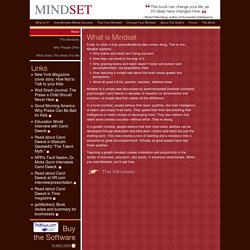
This is one. Mindset explains: Why brains and talent don’t bring success How they can stand in the way of it Why praising brains and talent doesn’t foster self-esteem and accomplishment, but jeopardizes them How teaching a simple idea about the brain raises grades and productivity What all great CEOs, parents, teachers, athletes know Mindset is a simple idea discovered by world-renowned Stanford University psychologist Carol Dweck in decades of research on achievement and success—a simple idea that makes all the difference. In a fixed mindset, people believe their basic qualities, like their intelligence or talent, are simply fixed traits. In a growth mindset, people believe that their most basic abilities can be developed through dedication and hard work—brains and talent are just the starting point. Teaching a growth mindset creates motivation and productivity in the worlds of business, education, and sports.
DuckworthPetersonMatthewsKelly_2007_PerseveranceandPassion.pdf. Let's Play The Logical Journey of the Zoombinis Part 1-Escape. Logical Journey of the Zoombinis. Logical Journey of the Zoombinis (also known as Zoombinis Logical Journey in the remake) is an educational puzzle computer game developed and published by Brøderbund Software for the original and The Learning Company for the remake.
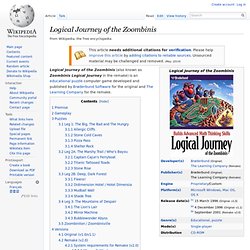
Premise[edit] The Zoombinis are a race of small blue creatures depicted with varying facial features, initially living in prosperous peace on a small island called Zoombini Isle; but later enslaved by their neighbors, the Bloats. The game then depicts the Zoombinis' search for a new home, featuring a variety of logical puzzles which the player must solve. Gameplay[edit] The Zoombini select screen at the start of each adventure The puzzles involve the physical features of the Zoombinis as part of the solution. In total, there are 625 unique combinations, of which the game allows you to make up to two Zoombinis with each combination, making 1,250 possible Zoombinis in total.
Boletín LLECE: La importancia de las habilidades no cognitivas en la educación post-2015. A medida que el movimiento global ‘Educación para Todos’ (EPT) se acerca al fin de su ciclo en el año 2015, llega para los países el momento de dar cuenta de los logros alcanzados y los desafíos pendientes con respecto a las seis Metas que fundamentan la iniciativa EPT.

En los últimos años la región América Latina y Caribe ha logrado progreso internacionalmente reconocido en las seis metas de EPT. Se destacan por ejemplo logros en cobertura y acceso a la educación, en todos los niveles del sistema escolar. Heckman y las habilidades no cognitivas en la educación. Uno de los aspectos más sorprendentes de la carrera investigadora de James Heckman es que, tras la consecución del Premio Nobel en el año 2000, su ritmo de producción académica no ha bajado, sino todo lo contrario.
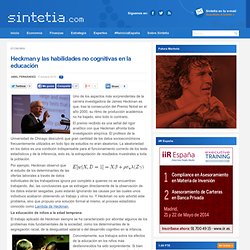
El premio recibido es una señal del rigor analítico con que Heckman afronta toda investigación empírica. Angela Lee Duckworth: The key to success? Grit.